Related Research Articles

The Politics of Pakistan takes place within the framework established by the constitution. The country is a federal parliamentary republic in which provincial governments enjoy a high degree of autonomy and residuary powers. Executive power is vested with the national cabinet which is headed by Prime Minister of Pakistan, who works coherently along with the bicameral parliament and the judicature. Stipulations set by the constitution provide a delicate check and balance of sharing powers between executive, legislative, and judicial branches of the government.
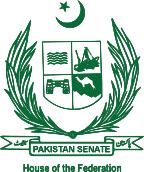
The Senate of Pakistan or Aiwān-e-Bālā Pākistān, constitutionally House of the Federation is the upper legislative chamber of the bicameral parliament of Pakistan. As of 2023, It has a total of 100 seats, of which 92 are elected by the provincial legislatures of Pakistan, with equal representation of 23 seats for all provinces, using indirect single transferable votes, while 4 represent the Federal Capital and the remaining 4 are representing FATA, until membership expiration in 2024. Elections are held every three years for one half of the house, each Senator has a term of six years. Unlike the National Assembly, the Senate is a continuing chamber and hence not subject to dissolution.

The Parliament of Pakistan is the federal and supreme legislative body of Pakistan. It is a bicameral federal legislature that consists of the Senate as the upper house and the National Assembly as the lower house. According to the Constitution of Pakistan, the President of Pakistan is also a component of the Parliament. The National Assembly is elected for a five-year term on the basis of adult franchise and one-man one-vote. The tenure of a Member of the National Assembly is for the duration of the house, or sooner, in case the Member dies or resigns. The tenure of the National Assembly also comes to an end if dissolved on the advice of the Prime Minister or by the president in his discretion under the Constitution.
The Lucknow Pact was an agreement reached between the Indian National Congress and the Muslim League (AIML) at a joint session of both the parties held in Lucknow in December 1916. Through the pact, the two parties agreed to allow representation to religious minorities in the provincial legislatures. The Muslim League leaders agreed to join the Congress movement demanding Indian autonomy. Scholars cite this as an example of a consociational practice in Indian politics. Bal Gangadhar Tilak represented the Congress while framing the deal, and Muhammad Ali Jinnah participated in this event.
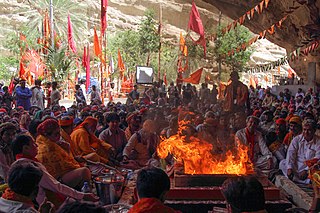
Hinduism is the second largest religious affiliation in Pakistan after Islam. While Hinduism was one of the dominant faiths in the region a few centuries back, today Hindus account for 2.14% of Pakistan's population or 4.4 million people according to the 2017 Pakistan Census, although Pakistan Hindu Council has claimed that there are 8 million Hindus living in Pakistan, making up 4% of the country's population. The Umerkot district has the highest percentage of Hindu residents in the country at 52.2%, while Tharparkar district has the most Hindus in absolute numbers at 714,698.
Anti-Hindu sentiment, also known as Hinduphobia, is a negative perception, sentiment or actions against the practitioners of Hinduism.

Chaudhry Aitzaz Ahsan is a Pakistani politician and lawyer. He served two times as the Leader of the House in the Senate of Pakistan from 1994 to 1997 and again from 2012 to 2015. He also served as the Leader of the Opposition in the Senate. He was elected a member of the Senate of Pakistan from Punjab in 1994. His tenure ended in March 2018.

The chairman of the Senate of Pakistan is the president-chair of the Senate of Pakistan. According to the Constitution of Pakistan, the chairman is a presiding official and that Senate must choose a chairman and deputy chairman for a time interval of three years.
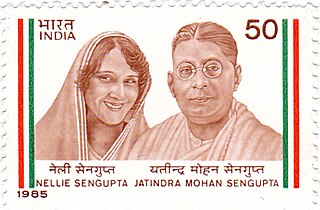
Nellie Sengupta was an Englishwoman who fought for Indian Independence. She was the first woman Alderman for Calcutta and was elected president of the Indian National Congress at its 48th annual session at Calcutta in 1933.

Sassui Palijo is a politician and a columnist from Thatta, Sindh, Pakistan. Palijo is currently affiliated to Pakistan Peoples Party, served as a Senator on women's reserved seat from Sindh from 2015 to 2021. She is also a two-time Member of the Sindh Provincial Assembly from PS-85 (Thatta-II).

Rooplo Shamtoji Kolhi was a Koli freedom fighter, who fought against the British Rulers in Karoonjhar Mountains at Nagarparkar of District Tharparkar, Sindh. His birth name was Rupaji Gohil. The British hanged him on 22 August 1858 with his companions. His anniversary is celebrated on August 22 every year by a faction of Jeay Sindh Qaumi Mahaz. He was the last commander of rebels hanged by the British officials.
Langlands School and College, in Chitral, North-West Pakistan, formerly known as Sayurj Public School, was the first community based public school controlled under the district administration in the remote district. In the beginning the school was managed and controlled by the board of governors and the deputy commissioner of the district the deputy commissioner was also chairmen of the board of governors.but still the status of the school is not clear. Today it educates about a thousand pupils, aged from four to eighteen, on four separate sites in and above the town of Chitral. More than a third of the pupils are girls, and the school has a record of academic excellence. The best students have gone on to scholarships in Lahore, doctorates in Australia and exchange programmes in America. Although private, school fees are very low, even by local standards.

Presidential elections were held on 30 July 2013 in Pakistan to elect the 12th President of Pakistan. Incumbent President Asif Ali Zardari’s term was scheduled to expire on 8 September 2013; and as such, Article 41 of the Constitution of Pakistan required the elections to be held no later than 8 August 2013. The Electoral College of Pakistan – a joint sitting of the Senate, National Assembly and Provincial Assemblies – were tasked with electing a new president to succeed President Zardari, who declined to seek a second term in office. After the Pakistan Peoples Party and its allies boycotted the presidential election, the two candidates were Mamnoon Hussain backed by the Pakistan Muslim League (N), and Wajihuddin Ahmed backed by Pakistan Tehreek-e-Insaf. Agra-born Hussain was elected president by a majority securing 432 votes. The elections were the first time in Pakistani history where a civilian president was elected while an incumbent civilian President was still in office, completing a historic and democratic transition of power that began with the 2013 General Elections.
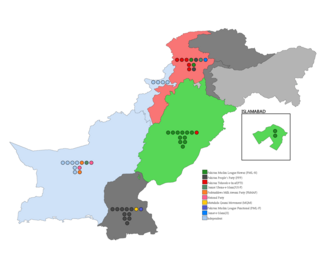
The triennial Senate Electionsof Pakistan were held on 3 March 2018 to replace 52 retiring senators - half of the Senate's strength - with the winning candidates serving six-year terms. Overall, Pakistan Muslim League (N) came out as the largest party, followed by the Pakistan Peoples Party and the Pakistan Tehreek-e-Insaf. The results of these elections were steeped in controversy due to rampant allegations of horse trading and vote-buying, which lead to the Prime Minister and opposition leader Imran Khan calling for reforms. Prior to this election, PML (N) candidates were declared as independents by the Election Commission of Pakistan owing to a Supreme Court judgment.
Hari Ram is a Hindu politician from Sindh, Pakistan. A five-time legilslator to the Provincial Assembly of Sindh, Ram was the first non-Muslim to win a non-reserved constituency in (West) Pakistan; he served in the Senate from 2012 to 2018.
Khatu Mal Jeewan is a Pakistani politician who served as member of the National Assembly of Pakistan and member of the Senate of Pakistan.
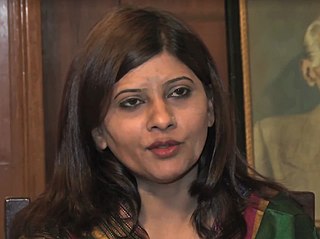
Krishna Kumari Kohli, also known by the nickname Kishoo Bai, is a Pakistani politician who has been the member of the Senate of Pakistan since March 2018. She is the second Hindu woman to hold this position. She is known for her campaigns for women's rights and against bonded labour; and was named as one of the BBC's 100 most influential women in 2018.
Neeru Chadha is an Indian jurist who serves as a member of the International Tribunal for the Law of the Sea (ITLOS). She previously served in various capacities for the Indian government's external affairs ministry including as the additional secretary and legal adviser heading its legal and treaties division.

In Pakistan, there are two laws governing Hindu marriages. One is the Sindh Hindu Marriage act of 2016 which is applicable in the Sindh province of Pakistan and another is the Hindu marriage act of 2017 which is applicable in Islamabad Capital Territory, Balochistan, Khyber-Pakhtunkhwa and Punjab provinces. However, there are no laws and amendments made to register a marriage between two Hindus- one from Sindh and another from a different Province.

Hinduism is the second largest religion in Sindh, comprising 8.73% of its population. Sindh has the largest population and the highest percentage of Hindus in Pakistan. The Sindh hosts the Shri Ramapir Temple whose annual festival is the second largest Hindu pilgrimage in Pakistan, after the Hinglaj Yatra.